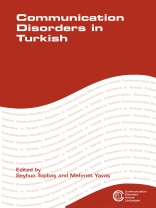This volume is the first to deal with Turkish communicative development and disorders, reflecting the use of Turkish by a sizeable population in multilingual settings in Europe, USA, and Australia. In addition to Speech-language Pathologists, the book will be of interest to professionals from related fields such as clinical linguistics, psychology, psycholinguistics, neurolinguistics, audiology, and special education. This book presents a compendium of information about the profession of speech-language pathology, cultural differences, assessment materials and research done in communication disorders in Turkey. It also covers acquisition and disorders in multilingual contexts where there is significant Turkish immigration.
表中的内容
PART I Prologue
Chapter 1: A Closer Look at the Developing Profession of Speech and Language Pathology – Seyhun Topbaş
Chapter 2: The Sound Inventory of Turkish: Consonants and Vowels – Handan Kopkallı-Yavuz
Chapter 3: Some Structural Characteristics of Turkish – Mehmet Yavaş
PART II Communication Development and Disorders in Monolingual Settings
Chapter 4: Normal Language Development in Turkish – Ayhan Aksu-Koç
Chapter 5: MLU as a Tool for Morphological Assessment in Turkish Children – Pınar Ege
Chapter 6: Turkish SALT: Computer Assisted Language Sample Analysis – Funda Acarlar and Judith Johnston
Chapter 7: Specific Language Impairment in Turkish: Adapting the TELD-3 as a First Step in Measuring Language Impairments – Seyhun Topbaş
Chapter 8: Speech Characteristics of Hearing Impaired Turkish Children – Ümran Tüfekçioğlu
Chapter 9: Language Characteristics of Hearing Impaired Turkish Children – Ümran Tüfekçioğlu
Chapter 10: Characteristics of Aphasia in Turkish – İlknur Maviş
Chapter 11: Semantic Relatedness Judgments in Normal Turkish-English Bilinguals – İlknur Maviş and Swathi Kiran
PART III Communication Disorders in Multilingual Settings
Chapter 12: Aspects of Acquisition and Disorders in Turkish-Dutch Bilingual Children – Kutlay Yağmur and Elma Nap-Koff
Chapter 13: Language Impairment in Turkish-Dutch Bilingual Children – Jan de Jong, Nazife Çavuş and Anne Baker
Chapter 14: Measuring the Language Abilities of Turkish-English Bilingual Children Using TELD-3-T – Theodoros Marinis and Duygu Özge
Chapter 15: Aspects of Language Acquisition and Disorders in Turkish-French Bilingual Children – Mehmet Ali Akıncı and Nathalie Decool-Mercier
Chapter 16: Specific Language Impairment in Turkish-German Bilingual Children: Aspects of Assessment and Outcome – Solveig Chilla and Ezel Babür
关于作者
Mehmet YavaŠis professor of Linguistics at Florida International University, Miami, Florida. His main area is phonology and its application to language acquisition and to speech and language disorders. His articles on Applied Phonology have appeared in numerous journals. He is the principal author of Avaliaçao Fonologica da Criança (a phonological assessment procedure for Brazilian Portuguese). His other publications are Phonological Disorders in Children (Routledge, 1991), First and Second Language Phonology (Singular, 1994), Phonology: Development and Disorders (Singular 1998), Applied English Phonology (Blackwell, 2006).












